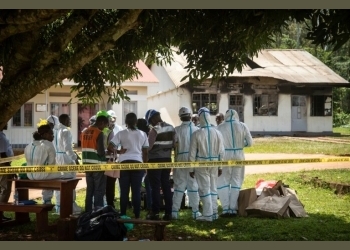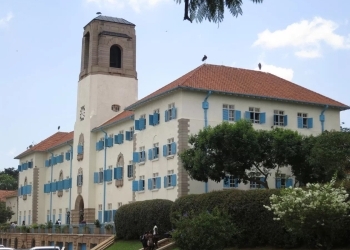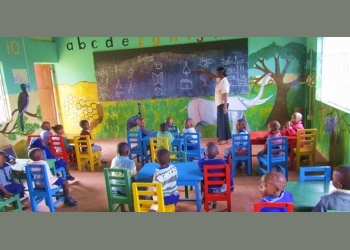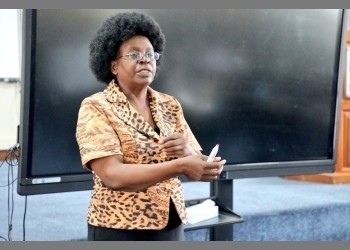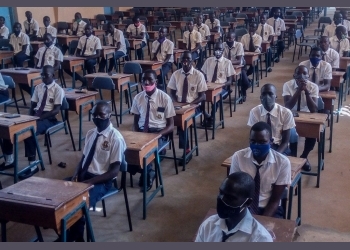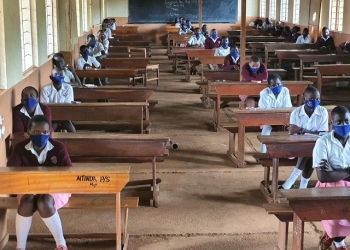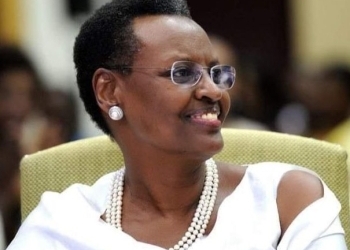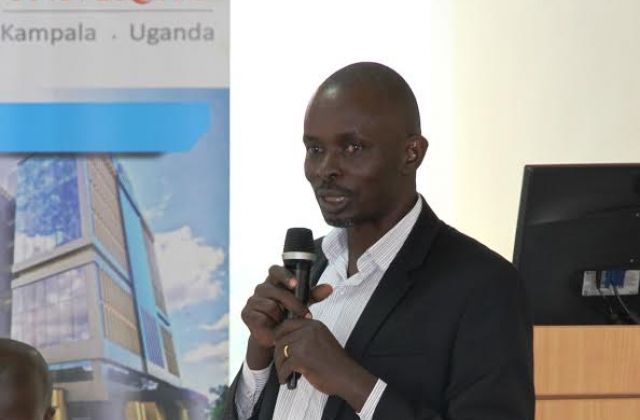
Q. Who is Victoria University?
A: Mr. Kasimbazi
Victoria University is Uganda’s first University located at the heart of Kampala city where excellence is cherished, pursued and celebrated. The University stands out as a pivot of academic excellence, offering a fresh and intellectually stimulating environment that nurtures critical and progressive thinkers. The university has state of the art facilities, is IT driven and research based and currently offers a number of undergraduate courses, diplomas and short.
Why is the university involved in organizing public dialogues on urban governance?
A: Mr. Kasimbazi
As part of the university’s on-going effort to make significant contribution to Uganda’s urban governance system for effective national economic development is the reason why it’s organizing these dialogues.
Also to provide capacity building opportunities to the public through cross learning and effective sharing of knowledge related to urban governance, integrated planning and development.
Q: Why organize dialogue on good governance and youth participation?
A: Mr. Kasimbazi
Governance is the back- bone on which the development processes are based to ensure services are delivered to citizens and that peace reigns in the nation.
The National Vision 2040 (chapter 6) aims at consolidating the tenets of good governance which include constitutional democracy; protection of human rights; the rule of law; free and fair political and electoral processes; transparency and accountability; Government effectiveness and regulatory quality; effective citizens participation in development processes; and peace, defence and security of the citizens and the country.
Good governance is the positive exercise of authority. It is characterized by citizen transformation and participation in governance, control of corruption, political stability, and respect for the rule of law, Government effectiveness, regulatory quality and effective knowledge management.
It is a prerequisite for achieving the required growth rates and therefore social transformation. Good governance is therefore of paramount importance for successful implementation of Vision 2040.
This dialogue therefore seeks to guide, harmonise, complement, enhance and promote the distinctive yet complementary actions and roles of all the stakeholders at all levels in youth development to enhance effectiveness of all efforts.
Q: Why focus on youth participation in urban governance?
A: Mr. Kasimbazi
- Since independence the trend of level of involvement and participation in leadership and decision making shows that the youth were mostly marginalized and their involvement seen only as beneficiaries of programmes/service rather than as active participants in the development process.
- The National Youth Council statute enacted in 1993 as a platform to organise youth into a unified body to participate in the development process has not yielded positive results. Therefore the participation or representation of the youth less than 25 years of age or those who are illiterate or semi illiterate in the position of leadership at all levels is limited. The low participation of the youth in decision-making is mainly due to: (i) Lack of leadership and management skills; (ii) Organisational regulatory barriers and impediments; (iii) Low resource allocation to Youth Programmes
- The university recognises the large number, strategic importance and immense potential in the youth for the development of the country. It however notes that youth have only been inadequately involved and their resources less harnessed in the socio-economic development and in the promotion of peace, democracy, good governance and upholding the values of the society. The university therefore advocates for mobilisation of resources to promote youth participation and integration in the mainstream of national development.
Q: Why ICTs in Good governance?
A: Mr. Kasimbazi
- Uganda is currently experiencing the world’s fastest urbanization rate at 5.1% annually -placing increasing pressure on resource-constrained city and urban local governments to maintain and improve livability standards of their areas of jurisdiction. But simultaneously, an ‘Information and Communication Technologies’ (ICT) revolution has swept across the country -as evidenced by vastly improved telecommunications and internet infrastructure, mobile communications penetration rates, and emergence of innovative information technology applications industry.
- Successful e-initiatives world over have demonstrated that harnessing of ICT can enable a range of activities when integrated into the urban development programs such as improving urban governance and economic development, alleviating urban poverty and slum upgrading, social accountability initiatives capturing citizens’ feedback and so forth. In this context, this dialogue seeks to explore strategies for transforming capabilities of urban authorities in Uganda through the power of ICT.
- The processes of urbanization, decentralization and the emergence of many towns in Uganda as drivers of growth are placing stress on the resources and capabilities of urban authorities. In the Uganda situation, access to public-sector services in basic sectors such as water and sanitation services, public safety, housing, and roads is often limited and increasingly constrained.
- But a number of innovative applications that harness ICT are helping to improve the daily lives of citizenry by transforming the delivery of services and reforming operations in most sectors of the economy. Using ICT Uganda can utilize these new technologies and applications to amplify the benefits of urban agglomeration, thereby serving their citizens and businesses better.
Q: What were the priority Issues for discussion?
A: Mr. Kasimbazi
The dialogue focused on identification of priority issues that will be advocated for by the youth in the various urban governance platforms in their respective institutions. While each institution has its own unique priorities I fill the dialogue highlighted the following priority issues that resonate with all the youth in the country.
Youth Economic Empowerment: The youth recognize that they are a key ingredient to Uganda’s economic growth and development. It is therefore critical for the youth to become economically empowered as they are critical engines of economic growth for the country
Education: The personal development of the individual young person, along with the development of local communities and the country as a whole is inextricably linked to the provision of quality, relevant and well-managed education system.
Health: Health (physical, mental, social and psychological well-being) is essential for the development of the country. Young people need to enjoy a health status that enables them to lead an economically and socially productive life.
Agriculture: As Uganda’s economy relies on the agricultural sector, financing of agro-businesses for the youth will have a boost in the economy and ensure food security. Provision of farm produce markets will motivate the youth to participate in agricultural activities and be self-reliant.
Legal Issues: Legislation and policies need to be favourable to the youth and their agenda. These policies include the National Youth Policy, Local Governments Development Plans, and Decentralization Policy just to mention a few.
Infrastructure Development: Science and Technology are pre-requisites to increase in productivity and promoting sustainable development. It has to be understood, however, that for the economy to grow it does not only require capital investment but also science, technology and environmental management.
Sports and Culture: Sports and Cultural activities and recreation are important to the total well-being of young people. Young people have physical needs that include general body fitness that can partly be attained through physical exercises. Socially and culturally, young people grow up and develop within a society or community and family that have various beliefs, customs, and norms and practice that impact on their lives.
What are the challenges facing the Youth in Urban Governance?
Transparency and Openness: With an aim to increase access to information on urban governance and economic opportunities, the public institutions are not providing s and publicizing enough information the youth to tap into available opportunities and civic engagement.
Legal and policy constraints: There also a number of legislations and policies that are an obstacle to effective local government-youth engagement. The youth should be considered as a key stakeholder and not as other interest group.
Youth Involvement in development projects: The youth should note that there are very few youth focused activities that have been incorporated into development plans.
- Where youth activities are included, youth are not involved in identifying the activities to match their needs. This has led to a lack of ownership and a disconnect between the youth and governments programs.
Knowledge of local government processes
- One of the key issues highlighted during this dialogue is the lack of knowledge among the youth of the existing channels through which they can influence local government or other layers of decision- making.
Awareness among the general public regarding local government processes, fora and means of engagement is low. The rights and obligations laid out in the various acts and policies are also not widely known.
Misunderstanding and narrow vision of youth needs
- The needs and issues concerning youth are usually envisioned narrowly, and in most cases are slumped up as other interest groups.
- Often, youth issues are left to be addressed by the civil society organizations with the local governments feeling that they have no responsibility to the youth and mainstreaming youth issues into the local government’s agenda and plans.
- There is also a lack of appreciation that the youth have diverse needs. For example, youth are commonly viewed as prone to violence, idle, unwilling to work, and primarily interested in sports.
Youth Platform and Networking
- There is an understanding among the youth that their agenda is best driven when there is a common ground and understanding on the youth needs, challenges and strategies towards increased youth participation and representation within local governance structures.
Capacity of elected local leaders
- Uganda has just concluded its local government elections. The Councilors going to run the local governments are therefore new to their roles with very little experience of the workings of local councils in integrated development planning.
- In addition to that they have minimal understanding of the roles and responsibilities of their positions. The capacity of the elected leaders is integral to the effectiveness of the local governments and their ability to represent the youth and their needs.
Funding constraints
- It should be noted that the lack of availability funds at local government level to undertake youth related activities is a major challenge. Even more, meaningful participatory governance also has cost implications and funding constraints are hindrance to its realization.
- The scope of participatory planning processes is determined by the available budget which is non-existent with the local governments.
Quality and calibre of youth leaders and representatives
- Dynamic and talented youth leaders who can overcome the barriers to meaningful engagement are essential for meaningful participation.
- Leaders and representatives not only need education, training and experience to undertake effective and constructive lobbying and advocacy, but must also have a visionary and developmental mindset to look beyond their own immediate priorities and be able to understand and promote the needs of the wider youth population and most importantly their communities.
Partisan politics
- With the current multi-party political dispensation there is a tendency to politicize local government business even before the recent local government elections.
- This politicization of local government business has become a huge challenge to participatory governance.
What are the possible solutions towards increased Youth Participation in Urban Governance?
Platforms for youth engagement
- The public dialogues are an opportunity to provide the youth with a platform to air out their views over different decisions that are being made by the authorities.
- They also provide an opportunity for establishing youth forums that will act as watch dogs in the provision of basic services and also be able to hold members of parliament, elected local leaders and the president accountable if they are not fulfilling the commitments they signed for.
Youth Coordination
- The University in collaboration with Ministry of Local Government, Ministry of Lands, Housing and urban development and Ministry of Gender and Community Development should play a central role in coordinating youth civic participation activities and acting as a mouthpiece for advocacy in the country.
- A key role for civil society is to help overcome the negative stereotyping of youth by demonstrating the positive contributions they can make to society. When this approach is taken with local governments (i.e. demonstrating specifically how youth can be valuable partners to local governments) it can have an immediate and positive effect on the way that youth are regarded and the relationship between civil society youth representatives and local governments.
Community level youth education
- While experiencing the reality of participatory governance in practice is essential for people to feel empowered to influence decision-making, education and sensitization also have a role to play in promoting active citizenship. Civic education will impart knowledge on local government processes; the provisions of the various policies and legislation; or the mechanisms through which they, as youth, can interact with local government.
- This community level civic education will be promoted by the youth who will sensitize community members in a transforming process for the youth through increased ownership.
- Community-level civic education and sensitization programmes can also play a role in transforming cultural perceptions and attitudes towards, for example, the participation of women or youth in politics.
Building the youth: Civil society Organizations (CSOs) have a central role to play both in demanding greater participatory governance opportunities and empowering and educating every day youth to engage in participatory governance processes. It is important that grassroots youth organizations are strengthened through training and capacity building to improve their lobbying and advocacy skills, as well as their ability to engage with and effectively represent their own youth constituents.
Building knowledge and understanding of youth needs by the University and Ministry of Local Government
Trainings for the elected leaders and technocrats will be essential to build the knowledge and understanding of individual leaders with regards to youth issues. Training could focus on topics such as the principles and practice of good urban governance; how to work with young people and youth organizations; understanding and assessing youth needs and the principles of mainstreaming.
Public dialogues as a vehicle for grassroots youth education
- The youth attending these public dialogues will promote grassroots youth participation within their communities. This is an important mechanism in ensuring youth participation becomes normalized in society so that people build the experience and knowledge of participatory governance from a young age and from the lowest level of community decision-making.
- Structures such as, Development Forums introduced in the 14 municipalities under USMID project in Ministry of Lands, Housing and Urban Development, are all potential forums where the youth can be empowered to contribute on a local level to decision-making that has a direct effect on their lives and in doing so gain the experience and the confidence to contribute at other levels of governance.
Advocate for the setting up of youth forum at all local government levels.
- The youth-dedicated local government-level forum will be important in championing for the mainstreaming of youth issues at all local governments.
- It will allow the youth organisations a platform to interact and share ideas while at the same time working towards common youth agenda.
- The youth affiliates will also promote the creation of a dedicated youth desk officers in every local governments whose role would be to champion the mainstreaming of youth issues.
Building local government - youth society interaction
- There should be concise efforts that should be made to strengthen the fora for local government - youth society interaction. The interaction can be strengthened by local government to local government learning programs to impart good practice among local leaders.
- This can be achieved through short course training program for local governments provided by the university. Also through public dialogues as platforms which will allow the information flow through regularly coordinated meetings to share information and provide feedback on activities.
Strengthening formal youth representation
- Formal government-endorsed youth representation will be advocated for which would play a primary role in representing and promoting the needs of the wider youth population. For them to be able to do that they need to be recognized, legitimate, empowered and resourced.
Youth mainstreaming
- Critically, the youth agenda will include reviewing all related urban governance policies and acts to ensure a number of key issues. The youth will advocate for the creation of youth committees at all local government level with a push for quotas for youth representation taking into account equal gender representation. This can also be extended to local government administrative staff and even political leadership.
- The dialogue strongly recommended that youth issues are an equally cross-cutting concern and should therefore be given the same treatment in policy.
What are the expected results of this public dialogue?
- The expected results of this dialogue are that, there will be increased capacity of members of youth organizations to meaningfully participate in urban governance; that there will be an increased public and local government awareness of the role of youth in urban governance, their needs with better representation of such; a strengthened urban governance structures through increased youth participation in decision-making processes through use of ICTs.
- This dialogue is first of its kind and recommended organizing more dialogues at Division level in Kampala and regional level upcountry resources permitting to engage youth across the country to understand their need and how we can unlock that potential for the youth to effectively participate in the development process in this country.
- This dialogue provided a roadmap for capacity building in enhancing youth participation in urban governance through the use of ICTs. The dialogue is also intended to ensure ownership of the youth agenda in urban governance, setting out critical issues to be advocated for; and identifying hurdles to be dealt with and set out solutions.
- The dialogue came up with possible recommendations and solutions as a roadmap toward the development of the capacity building strategy that will be used in addressing youth participation and governance challenges faced by the youth in the national development process.
- This dialogue presented the concerted voice of the youth to allow for a platform for increased youth participation in urban governance. The dialogue is a capacity building tool by university to train the youth and other stakeholders in good urban governance.
- This dialogue was a positive step towards building capacity to increase youth participation in good urban governance. Through this dialogue, we hope there will be a change in the mindset of the participants to spark their interest to actively engage the youth to participate in urban development processes.
- Through this dialogue, affiliates and representatives of government and civil society had clear terms of the roles they are expected to play in advocating for increased youth participation in urban governance.

